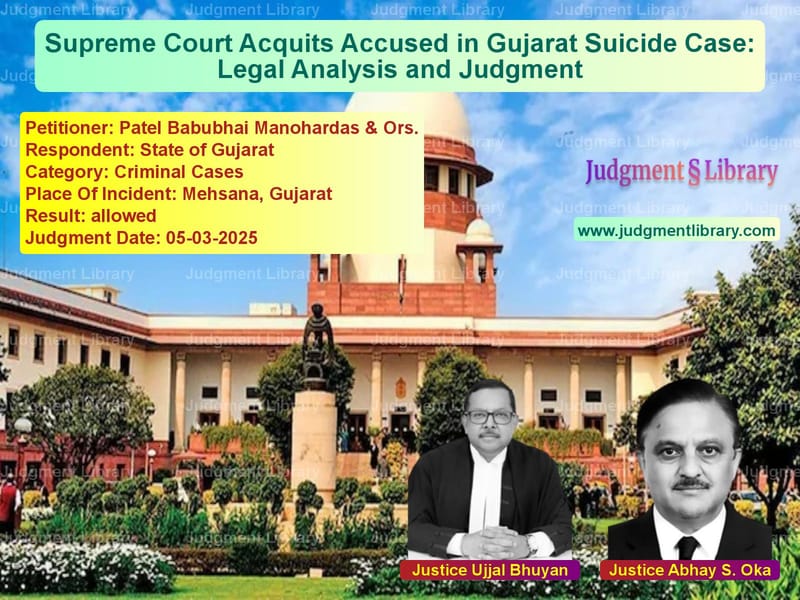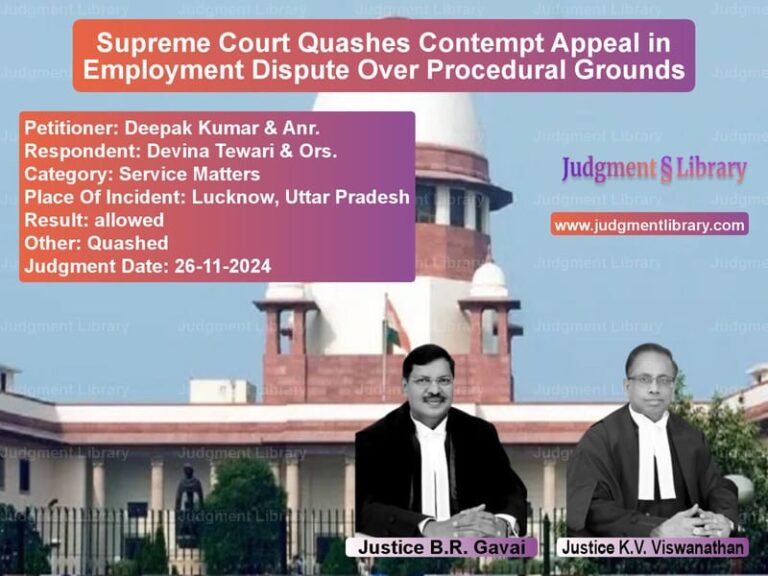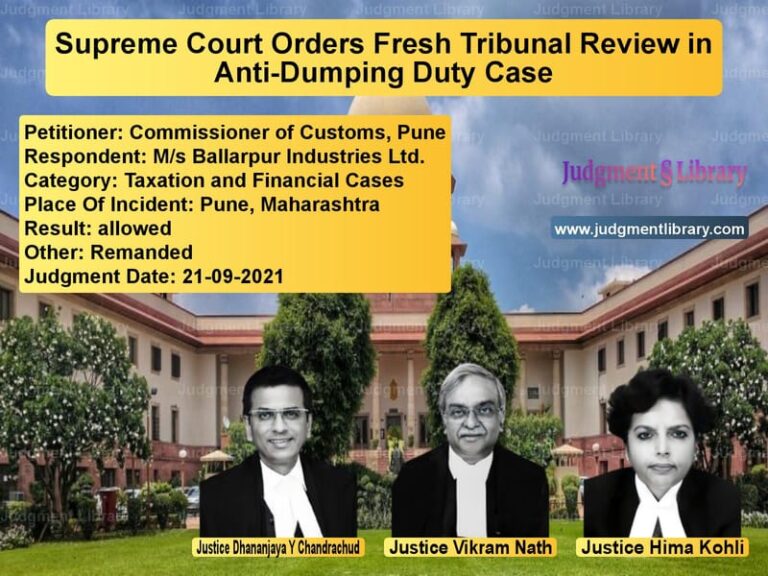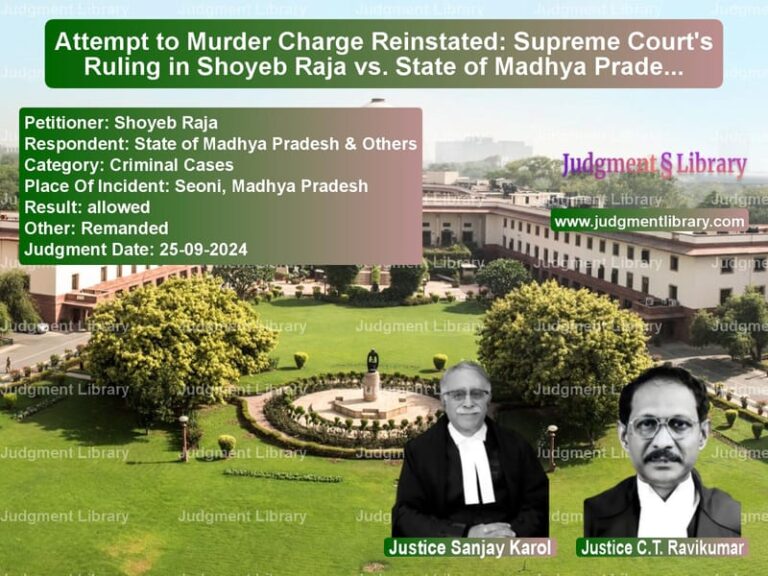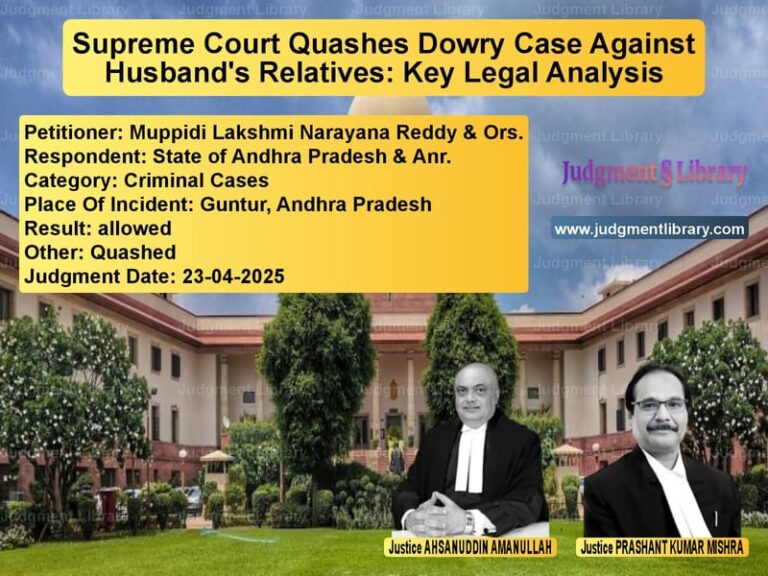Supreme Court Acquits Accused in Gujarat Suicide Case: Legal Analysis and Judgment
The Supreme Court of India recently delivered a landmark judgment in Patel Babubhai Manohardas & Ors. v. State of Gujarat, where it overturned the conviction of four accused individuals charged under Sections 306 and 114 of the Indian Penal Code (IPC). The case revolved around the tragic suicide of Dashrathbhai Karsanbhai Parmar and the alleged role of the accused in abetting his death.
The case had previously gone through the trial court and the Gujarat High Court, both of which upheld the conviction and sentenced the accused to five years of rigorous imprisonment. However, the Supreme Court found significant inconsistencies in the prosecution’s case, leading to the acquittal of the accused.
Background of the Case
The case originated from an FIR filed by the deceased’s wife, Jaybalaben, on May 14, 2009, nearly 20 days after her husband’s death. According to her statement, her husband had been blackmailed by the accused persons, leading him to misappropriate funds from his office. She claimed that the accused took advantage of him, forcing him into financial distress and ultimately driving him to suicide.
The trial court convicted the accused under Section 306 IPC (abetment of suicide) and sentenced them to five years of rigorous imprisonment. The Gujarat High Court upheld the trial court’s decision, leading to the accused filing an appeal in the Supreme Court.
Arguments of the Parties
Petitioners’ (Accused) Arguments
- The petitioners’ counsel argued that the prosecution had failed to establish a direct link between the accused and the suicide of the deceased.
- The suicide note surfaced only after 20 days of the incident, raising serious doubts about its authenticity.
- No corroborative evidence, such as photographs, videos, or financial records, was produced to support the allegations of blackmailing.
- The deceased was facing a disciplinary inquiry for misappropriation of funds at his workplace, which could have been the real reason behind his suicide.
- The legal principle of “abetment” under Section 306 IPC requires a clear act of instigation, which was absent in this case.
Respondent’s (State of Gujarat) Arguments
- The prosecution contended that the suicide note was genuine and confirmed that the accused had blackmailed the deceased.
- The handwriting expert’s report validated that the note was written by the deceased himself.
- Despite the absence of direct evidence, circumstantial evidence indicated a pattern of harassment and coercion that led to the deceased’s extreme step.
- The conviction by the trial court and its affirmation by the High Court were based on substantive evidence and should not be overturned.
Supreme Court’s Analysis and Judgment
The Supreme Court meticulously analyzed the evidence presented and identified key shortcomings in the prosecution’s case. The key observations were:
Delay in Lodging the Complaint
- The Supreme Court noted that the wife of the deceased filed the complaint 20 days after the incident.
- The FIR was lodged only after the suicide note surfaced, which was not found at the time of inquest or during initial investigations.
- The Court remarked, “Delay in lodging an FIR, especially in cases involving circumstantial evidence, casts a shadow of doubt on the prosecution’s case.”
Questionable Suicide Note
- The alleged suicide note was not found at the time of inquest.
- The brother of the deceased (PW-7) contradicted himself, initially claiming he found the note but later denying knowledge of it.
- The Supreme Court held, “When the credibility of the suicide note itself is in question, it cannot be relied upon as the sole basis for conviction.”
Lack of Direct Evidence
- No recovery of blackmail material, money, or jewelry allegedly taken from the deceased.
- No independent witness corroborated the allegations of harassment or coercion.
- The Supreme Court observed, “A conviction under Section 306 IPC requires clear evidence of instigation or aiding suicide, which is absent in the present case.”
Legal Precedents Cited
The Supreme Court relied on past judgments to reinforce its decision:
- In Ramesh Kumar v. State of Chhattisgarh, the Court held that instigation must be direct and proximate to the suicide.
- In Rajesh v. State of Haryana, it was observed that mere financial distress or general harassment does not amount to abetment of suicide.
- In Amalendu Pal v. State of West Bengal, the Court stated, “Conviction under Section 306 IPC cannot be sustained merely based on harassment allegations.”
Final Judgment
After a detailed analysis, the Supreme Court ruled:
“There is no act of incitement on the part of the accused proximate to the date on which the deceased committed suicide. The prosecution has failed to establish beyond reasonable doubt that the accused had a clear mens rea to abet the suicide. Accordingly, the appeal is allowed, and the accused are acquitted.”
Implications of the Judgment
This ruling reinforces the principle that:
- For a conviction under Section 306 IPC, direct instigation or aiding suicide must be proved beyond reasonable doubt.
- Delay in lodging an FIR and unreliable evidence can weaken the prosecution’s case.
- Courts must exercise caution when convicting individuals based on circumstantial evidence.
Conclusion
The Supreme Court’s decision in this case serves as a crucial reminder that allegations alone cannot justify a conviction under abetment of suicide laws. The judgment underscores the necessity for strong, corroborative evidence to establish guilt beyond reasonable doubt. This case will likely serve as a precedent in future cases concerning Section 306 IPC.
Petitioner Name: Patel Babubhai Manohardas & Ors..Respondent Name: State of Gujarat.Judgment By: Justice Ujjal Bhuyan, Justice Abhay S. Oka.Place Of Incident: Mehsana, Gujarat.Judgment Date: 05-03-2025.
Don’t miss out on the full details! Download the complete judgment in PDF format below and gain valuable insights instantly!
Download Judgment: patel-babubhai-manoh-vs-state-of-gujarat-supreme-court-of-india-judgment-dated-05-03-2025.pdf
Directly Download Judgment: Directly download this Judgment
See all petitions in Suicide Cases
See all petitions in Bail and Anticipatory Bail
See all petitions in Judgment by Ujjal Bhuyan
See all petitions in Judgment by Abhay S. Oka
See all petitions in allowed
See all petitions in supreme court of India judgments March 2025
See all petitions in 2025 judgments
See all posts in Criminal Cases Category
See all allowed petitions in Criminal Cases Category
See all Dismissed petitions in Criminal Cases Category
See all partially allowed petitions in Criminal Cases Category

